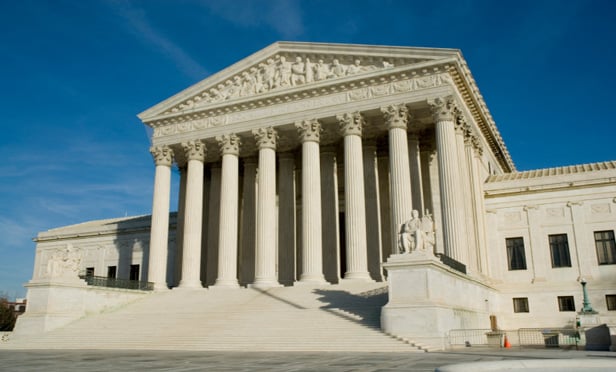 US Supreme Court
US Supreme Court
Last week, in a unanimous decision, the Supreme Court justices took a worker-friendly approach on behalf of 28,000 employees who accused Cornell University of paying excessive 403(b) plan recordkeeping fees, giving employees another chance to challenge their employer.
The Court revived the case against Cornell University, Cunningham et al. v. Cornell University, et al., ruling that workers don’t need to disprove legal exemptions upfront when challenging service provider deals, according to Jerry Schlichter, attorney at Schlichter Bogard, for the plaintiffs. Schlicter is a pioneer in legal action against 401(k) and 403(b) plan sponsors on behalf of retirees and savers.
Recommended For You
Filed in 2016, the lawsuit claimed that Cornell and its fiduciaries breached their ERISA duties by offering certain investment products that were not in the best interest of participants and failing to effectively monitor and control recordkeeping fees. The case was dismissed by a lower court, but the Supreme Court agreed to review the case.
Now that the high court has sided with employees, employer retirement industry groups are responding with deep concerns that the high court’s upcoming final decision could alter the legal landscape governing retirement plan fiduciaries.
“This ruling effectively invites a new wave of litigation that could burden plan fiduciaries for doing what ERISA expressly permits—engaging necessary service providers at reasonable fees,” said Tim Rouse, Executive Director of the SPARK Institute, whose members serve over 110 million participants in 401(k) and other defined contribution plans. “The decision rewards legal technicalities over practical realities and will ultimately harm plan participants by increasing costs and discouraging plan innovation.”
While the Court acknowledged concerns that this decision may lead to an “avalanche of meritless litigation,” it deferred to Congress to address those policy outcomes. The Court offered some suggestions—such as requiring plaintiffs to respond to affirmative defenses or invoking sanctions—but acknowledged these tools are rarely used and may not offer meaningful protection.
“The Court's decision shifts the burden to fiduciaries far too early in the process, requiring them to defend routine, good-faith transactions that are vital to plan operations,” said Michael Hadley, Chief ERISA Counsel to SPARK and Partner at Davis & Harman LLP. “Congress clearly intended for reasonable service arrangements to be exempt from these types of claims. Now, unless reforms are made, we risk seeing litigation drive decision-making in ways that don't serve participants’ best interests.”
The SPARK Institute, alongside the American Benefits Council and the ERISA Industry Committee (ERIC), filed an amicus brief in the case arguing that the lower court’s more balanced standard was consistent with ERISA’s text and purpose. In light of the Court’s ruling, SPARK calls on Congress to revisit ERISA’s litigation framework and explore common-sense reforms that will discourage frivolous lawsuits while continuing to protect participants.
Related: Supreme Court hears Cornell’s 403(b) excessive fees case: Did it open the floodgates for more suits?
“The U.S. Supreme Court appears to acknowledge that its decision has the potential to open the floodgates for ultimately meritless litigation, but the Court also provided a number of off-ramps to federal courts to avoid such outcomes, said Tom Christina, Executive Director of the ERIC Legal Center.
“As stakeholders continue to review the implications of the decision, courts should use these tools to hold plan sponsors harmless for transactions the law clearly permits,” said Christina. “And noting its admission that the Court was constrained by the structure of the statute, Congress should take action to address the decision so that plan sponsors, workers, and retirees aren't left to pay the price for what could well be a tsunami of frivolous litigation.”
The Supreme Court decision on this case could come “at any time before the term ends in June," said Schlichter.
© Touchpoint Markets, All Rights Reserved. Request academic re-use from www.copyright.com. All other uses, submit a request to [email protected]. For more inforrmation visit Asset & Logo Licensing.







